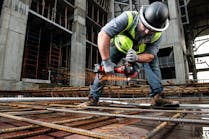After a long, bipartisan negotiation, a $1 trillion infrastructure bill awaits President Biden's signature.
An AP report highlights what's in the sprawling bill for roads, bridges, public transit, passenger and freight rail, EVs, Internet access, the electric grid, airports, and water and wastewater. You can read the entire article here.
Roads, bridges
The bill would provide $110 billion to repair the nation’s aging highways, bridges, and roads. The almost $40 billion for bridges is the single largest dedicated bridge investment since the construction of the national highway system, according to the Biden administration.
Public transit
The $39 billion for public transit in the legislation would expand transportation systems, improve accessibility for people with disabilities, and provide dollars to state and local governments to buy zero-emission and low-emission buses.
Rail
To reduce Amtrak’s maintenance backlog, which has worsened since Superstorm Sandy nine years ago, the bill would provide $66 billion to improve the rail service’s Northeast Corridor (457 miles), as well as other routes. It’s less than the $80 billion originally asked for, but it would be the largest federal investment in passenger rail service since Amtrak was founded 50 years ago.
EVs
The bill would spend $7.5 billion for electric vehicle charging stations. It would also provide $5 billion for the purchase of electric school buses and hybrids.
Internet access
The legislation’s $65 billion for broadband access would aim to improve internet services for rural areas, low-income families, and tribal communities. Most of the money would be made available through grants to states.
The electric grid
To protect against the power outages, the bill would spend $65 billion to improve the reliability and resiliency of the power grid. It would also boost carbon capture technologies and more environmentally friendly electricity sources like clean hydrogen.
Airports
The bill would spend $25 billion to improve runways, gates, and taxiways at airports and to improve terminals. It would also improve aging air traffic control towers.
Water, wastewater
The legislation would spend $55 billion on water and wastewater infrastructure. It has $15 billion to replace lead pipes and $10 billion to address water contamination from polyfluoroalkyl substances—chemicals that were used in the production of Teflon and have also been used in firefighting foam, water-repellent clothing, and many other items.
Source: AP





